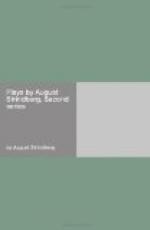Tekla is such a “pure culture” of a group of naturally correlated mental and moral qualities and functions and tendencies—of a personality built up logically around a dominant central note. There are within all of us many personalities, some of which remain for ever potentialities. But it is conceivable that any one of them, under circumstances different from those in which we have been living, might have developed into its severely logical consequence—or, if you please, into a human being that would be held abnormal if actually encountered.
This is exactly what Strindberg seems to have done time and again, both in his middle and final periods, in his novels as well as in his plays. In all of us a Tekla, an Adolph, a Gustav—or a Jean and a Miss Julia—lie more or less dormant. And if we search our souls unsparingly, I fear the result can only be an admission that—had the needed set of circumstances been provided—we might have come unpleasantly close to one of those Strindbergian creatures which we are now inclined to reject as unhuman.
Here we have the secret of what I believe to be the great Swedish dramatist’s strongest hold on our interest. How could it otherwise happen that so many critics, of such widely differing temperaments, have recorded identical feelings as springing from a study of his work: on one side an active resentment, a keen unwillingness to be interested; on the other, an attraction that would not be denied in spite of resolute resistance to it! For Strindberg does hold us, even when we regret his power of doing so. And no one familiar with the conclusions of modern psychology could imagine such a paradox possible did not the object of our sorely divided feelings provide us with something that our minds instinctively recognise as true to life in some way, and for that reason valuable to the art of living.
There are so many ways of presenting truth. Strindberg’s is only one of them—and not the one commonly employed nowadays. Its main fault lies perhaps in being too intellectual, too abstract. For while Strindberg was intensely emotional, and while this fact colours all his writings, he could only express himself through his reason. An emotion that would move another man to murder would precipitate Strindberg into merciless analysis of his own or somebody else’s mental and moral make-up. At any rate, I do not proclaim his way of presenting truth as the best one of all available. But I suspect that this decidedly strange way of Strindberg’s—resulting in such repulsively superior beings as Gustav, or in such grievously inferior ones as Adolph—may come nearer the temper and needs of the future than do the ways of much more plausible writers. This does not need to imply that the future will imitate Strindberg. But it may ascertain what he aimed at doing, and then do it with a degree of perfection which he, the pioneer, could never hope to attain.




